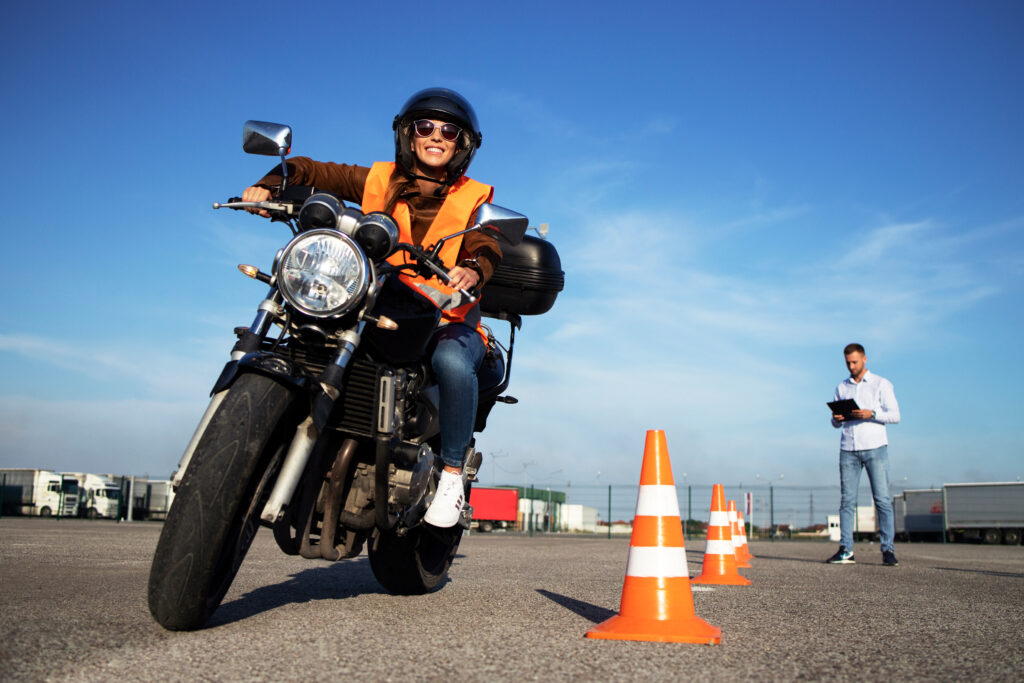Mar 11, 2024
How To Get A Motorcycle License?
Revving Up for Freedom: A Guide to Getting Your Motorcycle License
The open road beckons, the wind whispers adventure, and the call of the motorcycle is undeniable. But before you can truly experience the thrill of cruising on two wheels, obtaining a motorcycle license is essential. This guide provides a roadmap to navigating the process of getting your motorcycle license, equipping you with the knowledge and steps required to earn your freedom on the open road.
Know the Requirements: Understanding Your State’s Licensing Process
While the general steps of obtaining a motorcycle license are similar across most states, the specifics can vary. Here’s a deeper dive into understanding your state’s licensing process:
-
State Department of Motor Vehicles (DMV) Website: Your first stop should be your state’s Department of Motor Vehicles (DMV) website. The DMV website typically provides a dedicated section for motorcycle licensing information. This section should outline:
- Minimum Age Requirement: The minimum age to obtain a motorcycle license varies by state. Some states allow teenagers as young as 15 or 16 to apply for a learner’s permit with parental consent, while others require applicants to be 18 or older.
- Learner’s Permit or Motorcycle Instruction Permit (MIP): Most states require obtaining a learner’s permit or MIP before applying for a full motorcycle license. This permit allows supervised practice riding and familiarization with traffic laws. The DMV website will detail the eligibility requirements, application process, and any restrictions associated with the learner’s permit (e.g., requiring a licensed rider to be present, limitations on riding hours or passengers).
- Written Knowledge Test: Information on the written knowledge test format and content should be available. This typically includes topics like motorcycle safety laws, traffic regulations, safe riding practices, and motorcycle operation. The website might offer practice tests or study guides to help you prepare.
- Motorcycle Skills Test: The DMV website should outline the skills assessed during the motorcycle skills test. This might include maneuvering at slow speeds, emergency braking, handling curves, and proper lane changes. Some states allow using your own motorcycle for the test, while others require using a specific type of motorcycle provided by the testing facility.
- Fees: The DMV website will detail any associated fees for the learner’s permit, written knowledge test, and motorcycle skills test.
-
Contacting Your Local DMV: If you have any questions or require further clarification beyond the information available online, don’t hesitate to contact your local DMV office directly. A representative can answer your specific questions and guide you through the process.
Preparing for the Journey: Equipping Yourself for Success
Getting your motorcycle license requires dedication and preparation. Here are some steps to take before you hit the road:
- Enroll in a Motorcycle Safety Course (Optional but Highly Recommended): Many states offer motorcycle safety courses that teach essential skills and can qualify you for a waiver of the skills test or a discount on your motorcycle license fee.
- Gather Necessary Documents: Collect the required documents for your learner’s permit or motorcycle license application. These usually include proof of identity, residency, and proof of passing a vision test.
- Choose Your Motorcycle (For the Skills Test): Decide on the type of motorcycle you’ll use for the skills test. Some states allow you to use your own motorcycle, while others require using a specific type of motorcycle provided by the testing facility.
- Practice Riding: Find a safe and controlled environment to practice your motorcycle riding skills. An empty parking lot or a designated practice area is ideal.
The Learner’s Permit Phase: Building Your Foundation
The learner’s permit allows you to gain valuable experience under specific restrictions. Here’s what to expect:
- Restrictions on Operation: Your learner’s permit might restrict your riding hours (e.g., daylight only), require a licensed rider to accompany you, or limit your passenger capacity.
- Practice Makes Perfect: Use this time to practice basic motorcycle skills like starting, stopping, turning, shifting gears, and maintaining proper body position.
- Knowledge is Power: Supplement your practical experience by studying motorcycle safety manuals and attending motorcycle safety courses (if not mandatory in your state).
Passing the Test: Demonstrating Your Skills and Knowledge
Once you’ve honed your skills and knowledge, it’s time to conquer the tests. Here’s how to prepare:
- Written Knowledge Test: Review motorcycle safety manuals, practice tests available online, and ensure you understand traffic laws and safe riding practices.
- Motorcycle Skills Test: Familiarize yourself with the specific skills assessed during the test, such as maneuvering, braking, and emergency procedures. Practice these skills under the guidance of a qualified instructor if possible.
- Stay Calm and Focused: Test day can be nerve-wracking, but focus on demonstrating your skills and knowledge. Take a deep breath, relax, and trust your preparation.
Beyond the License: Continuous Learning for Lifelong Safety
Earning your motorcycle license is just the beginning of your journey. Here are some additional tips to ensure safe and enjoyable riding:
- Invest in Proper Gear: Always wear a DOT-approved helmet, protective clothing like a leather jacket and motorcycle boots, and gloves.
- Motorcycle Maintenance: Learn basic motorcycle maintenance tasks like checking tire pressure and fluid levels. Schedule regular professional maintenance for your motorcycle.
- Defensive Riding Techniques: Develop defensive riding skills by anticipating hazards, maintaining awareness of your surroundings, and leaving ample space between yourself and other vehicles.
- Lifelong Learning: Continuously educate yourself on safe riding practices and new traffic laws. Consider taking advanced motorcycle safety courses to hone your skills further.
The Open Road Awaits: Embrace the Ride with Confidence
By following these steps, preparing diligently, and prioritizing safety, you can successfully obtain your motorcycle license and embark on countless adventures on two wheels. Remember, the journey is just as important as the destination. Embrace the learning process, prioritize safety,and savor the thrill and freedom that motorcycling offers.
Motorcycle ownership and riding open a world of possibilities. From scenic day trips to weekend getaways, the open road beckons. With your newfound knowledge, preparation, and a focus on safety, you can navigate the process of obtaining your motorcycle license and experience the joy of riding with confidence. So, gear up, hit the road responsibly, and enjoy the ride!
More Details